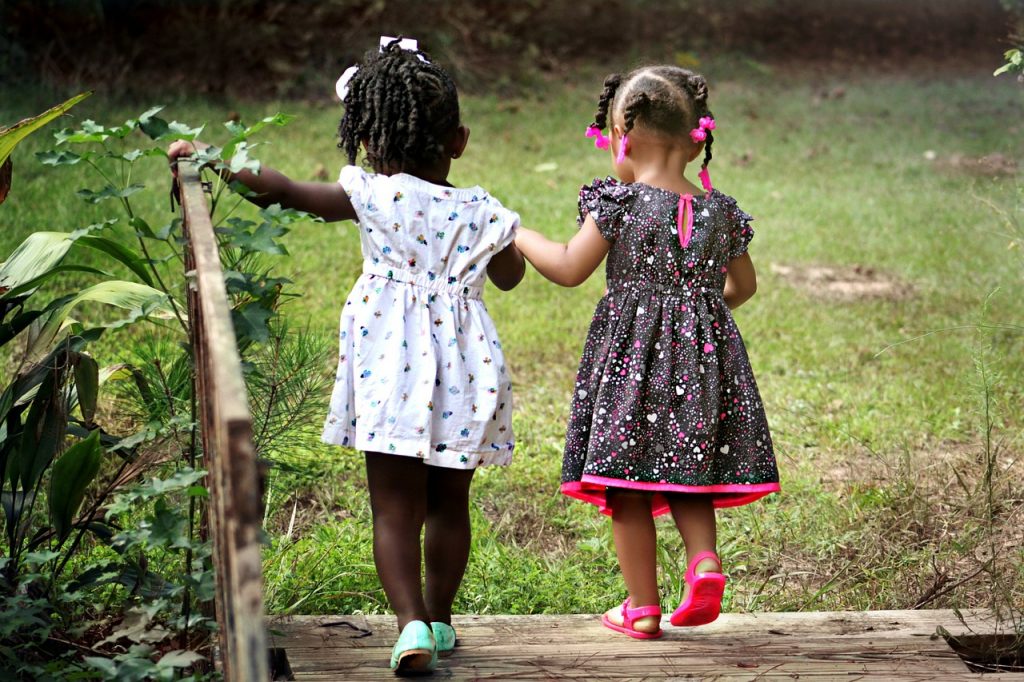Learning self-help and social skills are important skills for young children to be able to participate in the social world we live in. When young children become preschoolers, they generally learn about what gender they identify with, how to dress themselves, and how to recognize their written names. Although preschoolers will still enjoy saying “no” to you, they are beginning to understand the benefits of agreeing with you. They know that it feels good to win your approval. At this stage, they begin to feel a sense of belonging to a family or classroom.
Taking Turns and Sharing
Preschoolers are also learning how to get along with others by taking turns and sharing. Throughout the day, provide your preschooler with opportunities to share. In a toddler setting, it’s appropriate to have several duplicates of one popular toy. In the preschool setting, it’s appropriate to have a few duplicates of one item, such as outdoor balls, and tricycles. However, it’s best not to duplicate too many toys. You want to set the stage for teaching your preschoolers the valuable skills of taking turns and sharing.
Encouraging Independence
Your preschooler should be encouraged to be more independent, within reason (always be aware of his safety). Allow him to dress himself by “working” his own fasteners. Of course, you may need to help him learn how to button and unbutton his pants or how to work the zipper on his coat. Encourage him to do these things on his own as much as possible. Many adults hold back their children’s development by “helping” too much. It takes practice to master new skills, and practicing by himself is truly the best way to learn. When he learns these skills, he will feel great pride in dressing himself without your help. Of course, on the other hand, he will learn about caring and helping others by how you care and help him. Therefore, strike a balance between helping and encouraging independence.
Helping with Chores
Allow your preschoolers to “open” her banana, pour her juice, set the table, wipe the table, put away snacks, and more. Involving your preschoolers in routine classroom tasks builds their sense of belonging, and helps them develop healthy self-images. The empowerment they gain from completing small tasks will prepare them to take on larger challenges!
Using the Potty
Preschoolers may be able to use the toilet on their own, but they will still need your guidance with healthy bathroom use. Remind them to carefully wipe themselves, to flush the toilet, to fasten their pants and clothing before coming out of the stall, and to wash their hands with soap.
At this stage, young boys should learn to use a urinal. Find a public bathroom with urinals, and stop in to “practice” from time to time. If you are a single mother, ask your father, brother, or trusted male friend to help your preschooler learn how to use a urinal. Most elementary schools have urinals, and boys will need to be familiar with them before entering kindergarten.
Modeling Appropriate Behaviors
Remember to model the behaviors you want your preschooler to master, such as kindness, generosity, forgiveness, cooperation, creativity, patience, and sharing. It is vital that preschoolers learn appropriate social skills, such as sharing, taking turns, not using profanity in public, and being kind to other children. Let your preschooler know that he may not steal from, hurt, or insult others. At this age, your child should be expected to use polite phrases, such as “please” and “thank you.”
Table Manners
Children at this age should begin to learn table manners. Teach your preschooler to speak only when there is no food in his mouth, to wait to speak until others are finished speaking, to keep his food on his plate, and to use a spoon or fork when appropriate. Practicing good table manners will prepare your preschooler for eating with others.
Asking for Your Preschooler’s Affection
Allow your preschooler to say “no thank you” to unwanted affection. Do not push your small child into giving affection. Reassure him that he can give hugs and kisses when it feels right to him. This may be embarrassing when you visit relatives, but it is important to respect his wishes in this area. Explain to your relatives that your preschooler is learning about respecting his body by only giving hugs and kisses when it’s his choice.


